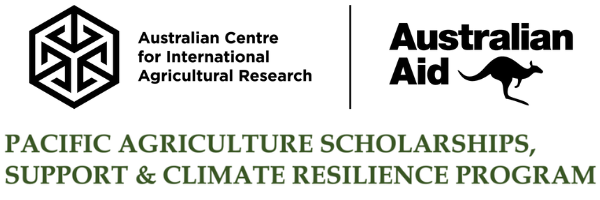Protecting the Pacific’s Citrus: PASS-CR Scholar’s Lessons from the Asian Citrus Psyllids Workshop
Semi K Hausia, a PASS-CR scholar, recently attended the Asian Citrus Psyllids (ACP) Workshop in Samoa. The workshop aimed to train and expose participants to the devastating risk of the Huanglongbing (HLB) disease. The workshop emphasised the importance of vigilance among citrus growers and stakeholders, urging them to engage in preventive measures and be prepared to manage the disease should it make its way to Samoa.
Sharing Insights from Tonga
At the workshop, Semi presented his research on “Assessing the Biosecurity Risk of Huanglongbing (HLB) to the Domestic Tongan Citrus Industry.” His presentation highlighted the challenges facing Tonga. The workshop provided a platform for Semi to share his findings, exchange ideas, and gain valuable insights from experts in the field.
Key Learnings and Benefits
Semi gained skills and contacts that will significantly enhance his research. Among the key benefits were:
Microscopic Identification: Semi had the opportunity to identify ACP at all life stages—egg, nymph, and adult—under a microscope.
Surveillance Techniques: He learned surveillance methods to track the metamorphosis of ACP.
Stakeholder Consultation: Semi gained insights into engaging with stakeholders to raise awareness and plan future preventive measures against HLB.
Biological Control Challenges: The workshop provided access to information on biological agents and the complexities of introducing these agents into new environments.
Practical Experience: Semi visited citrus farms and other ACP host plants, such as orange jasmine.
Expert Feedback: He received direct feedback on his research proposal from Dr David Morgan of the California Department for Food and Agriculture and Professor M. Furlong of the University of Queensland, Australia.
Networking Opportunities: Semi connected with leading figures in the field, including Dr Morgan, an expert in ACP and biological control related to HLB disease, and Professor Furlong, an entomologist and project manager for an emerging pest project. He also connected with Angelica Tugaga, the contact point for the Scientific Research Organisation of Samoa (SROS), regarding the emerging pest project in Samoa.
Acknowledgements
Semi’s participation in this workshop was made possible by funding provided by the ACIAR PASS-CR program. He extends his gratitude to his supervisors, Varsha and the FNU financial team, and Professor Iji for their support and to Professor Furlong for extending the invitation to this event.
The involvement of PASS-CR scholars in such significant events and the chance to present their research underscores their key roles in advancing research and contributing to the Pacific region’s academic and practical knowledge.



